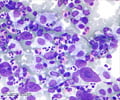The cause of some types of leukemia,s is still poorly understood, though leukemia is one of the best studied cancers. Now, a newly found mutation in acute myeloid leukemia patients
The cause of some types of leukemias is still poorly understood, though leukemia is one of the best studied cancers. Now, a newly found mutation in acute myeloid leukemia patients could account for half of the remaining cases of adult acute leukemia with an unknown origin.
"The molecular biology of leukemia has been studied for the last 20 years and we thought we had found most of the common genes for leukemia," comments senior author Craig B. Thompson, MD, director of the Abramson Cancer Center of the University of Pennsylvania. "Now we’re able to point to a distinct type of mutation for half of the remaining leukemia,s for which we didn’t know the cause and between one-quarter and one-third of leukemia,s in older patients." The findings are described online this week in Cancer Cell.Using samples from a Penn tissue bank of acute myeloid leukemia (AML), Thompson and colleagues found that AML patients have increased levels of a molecule called 2HG. AML is a quick-moving, deadly cancer that starts in the bone marrow and soon moves into the blood. The increased amounts of 2HG stem from a mutation in one of two related metabolic enzymes, IDH1 or IDH2.
Screening for elevations in 2HG in the tissue bank, the team found that IDH1 and IDH2 mutations are observed in over 23 percent of the AML patients studied. A shared feature of cancer-related IDH mutations is increased production of 2HG.
What’s more, the IDH gene mutations are the first known cancer mutations that result in the creation of a protein with a new enzymatic activity. Most cancer-causing mutations make the mutated protein either overactive or inactive in performing its normal function. In contrast, the mutations in the IDH proteins give these enzymes the blueprint to create a new molecule not normally produced by cells. Interestingly, the researchers also found that IDH2 mutations are more common than IDH1 mutations in AML.
Other gene-related causes of leukemia include breaks and reformations in chromosomes called trans-locations.
The ease with which the researchers were able to detect IDH mutations in tumor samples, and the ability to identify patients with these mutations due to the presence of increased 2HG gives hope for better detection of AML and suggests that blocking the production of 2HG might reverse the ability of the mutant genes to maintain the leukemic cells.
Advertisement
Source-Eurekalert
TRI












